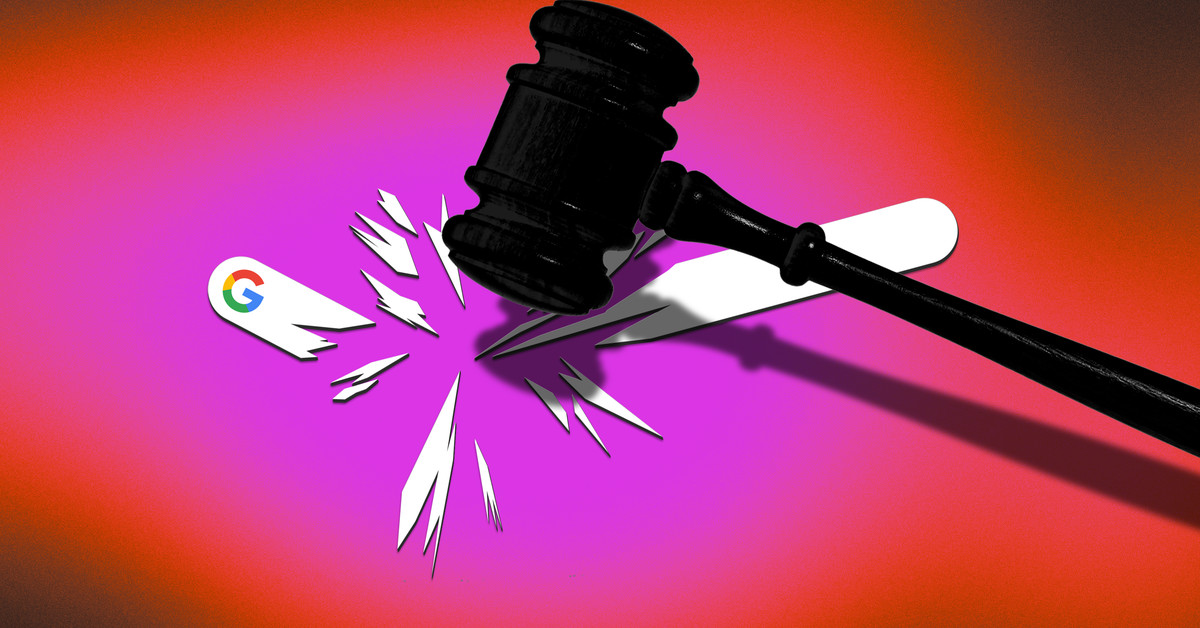
Google is one of the biggest tech companies in existence, but its empire is built on one little white search bar, and the US Justice Department has just launched what might be one of the biggest challenges it’s ever faced. In one of the largest antitrust trials in recent memory, the government argues that Google owes its dominance not simply to a good design but to a series of coercive deals that have let the search engine market stagnate — while Google complains it’s being punished for success.
For all that, the trial began quietly. I got to the courthouse around sunrise for the start of US v. Google, worried I’d find a line around the corner. Instead, the sidewalk was nearly empty, populated by a handful of similarly cautious early arrivals. “I thought there’d be more people,” one said while we waited in the muggy DC air. In the hours that followed, a small crowd emerged — filling the courtroom and spilling into an overflow room and two dedicated media rooms for journalists. A man in an Uncle Pennybags-style top hat, fake mustache, and monocle wandered the halls of the courtroom; “I’m here to highlight Google’s monopoly and provide moral support as a fellow billionaire,” he told me between mustache twirls. He admitted he might not be there to keep up the joke every day — it’s a 10-week trial, he conceded, and “I have a job.”
The case against Google is relatively straightforward and also potentially explosive. The Justice Department argues that around 2010, Google began using anti-competitive tactics to maintain an overwhelming search engine monopoly. Already dominant over alternatives like Bing and Yahoo, it cemented its position with the “power of defaults,” striking deals that put Google’s product front and center. That included paying Apple and Mozilla to make Google the default engine in Safari and Firefox and requiring that Android manufacturers prominently display a Google search widget on phones. (That agreement is called the Mobile Application Distribution Agreement or MADA, and it’s been legally contentious in Europe for years.) As it grew, it used vast quantities of search data to improve its engine, creating a feedback loop that — the Justice Department alleges — has made it almost impossible to beat. “This case is about the future of the internet and whether Google Search will ever face meaningful competition,” said attorney Kenneth Dintzer in opening statements.
“This is a monopolist flexing.”
US v. Google follows a series of abortive legal attempts to limit the power and growth of America’s biggest tech companies. It’s the Justice Department’s most aggressive action since its 1990s antitrust lawsuit against Microsoft, which established it had shut down competition for web browsers on its dominant Windows system. But this trial kicks off two years after a district judge found Apple could maintain its locked-down iOS ecosystem and two months after Microsoft won a ruling letting it buy Activision Blizzard, continuing a rapid consolidation of the games industry. In both battles, the companies convinced a judge that they weren’t simply trying to lock up a market — they were making decisions that helped consumers, too. They also painted the allegations as disingenuous complaints from fellow tech companies who couldn’t compete fairly: in Apple’s case, the Fortnite publisher Epic, and in Microsoft’s, the rival console maker Sony.
Google has taken a similar approach. “If Google is prevented from competing, that won’t make Yahoo or DuckDuckGo run faster,” attorney John Schmidtlein said in the company’s opening statement. While the Justice Department has drawn parallels between ’90s Microsoft and modern-day Google, Schmidtlein said that the facts in US v. Google and the antitrust fight over Microsoft’s unloved Internet Explorer browser “could not be more opposite and different,” arguing that people overwhelmingly and proactively choose Google even when they’re given alternatives. Separately, he argued that Google’s default search deals give web browsers much-needed revenue and that its Android agreements help create a viable mobile competitor to iOS.
So far, the Justice Department is combating this argument by focusing on reams of internal communications it obtained during its investigations. It’s zeroed in on memos and emails where Google nakedly lays out the value it gets from being a default search option, as well as messages that allegedly dictate precise terms for how Apple and others could use any non-Google Search-adjacent service. (“Your honor, this is a monopolist flexing,” intoned Dintzer.) Schmidtlein has derided the excerpts as cherry-picked and “out of context.” But whatever they ultimately reveal, the Justice Department’s goal so far is clear: keep the focus on executives talking about how Google’s actions benefit Google, not the consumers it says it’s trying to serve.
The Justice Department is also drawing direct parallels to the Microsoft antitrust case but in a complicated way. Some of the most damning allegations included Microsoft making unvarnished and rhetorically violent statements about “cut[ting] off Netscape’s air supply” in the browser wars. This time around, government attorneys are pointing to communications in which Google employees carefully avoid terms that could raise antitrust watchdogs’ ire.
Before the trial, the Justice Department sought to sanction Google for deliberately (and allegedly) deleting conversations that could illuminate how it approaches competition. In the first week, it’s focused on the tech giant’s judicious use of language. Its first witness was Google chief economist Hal Varian, whom Dintzer led through a series of email chains about Google’s search business. In one, Varian takes issue with Marissa Mayer (who at that point oversaw Google’s homepage) referring to the company’s “market share” — a term that could indicate overall market dominance. “Let’s make sure we are consistent in calling this ‘query share’ rather than ‘market share,’” Varian told another Google employee, Penny Chu. “Absolutely, I’m aware of not using the word ‘market,’” Chu replied. “The one big thing I remember from all that Legal training.”

